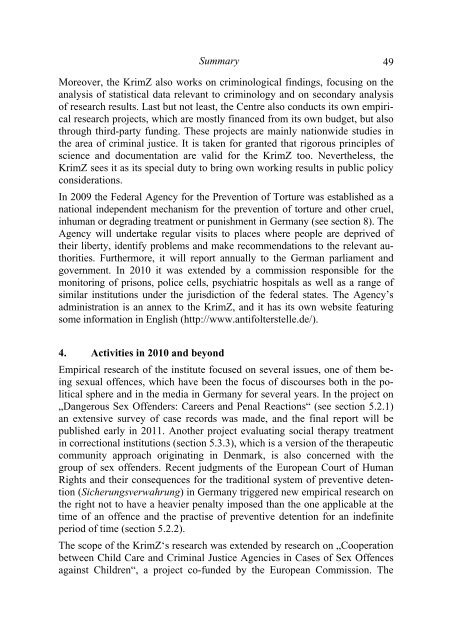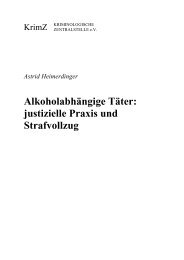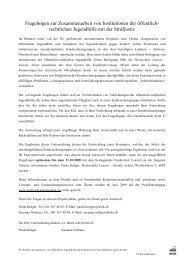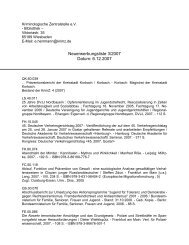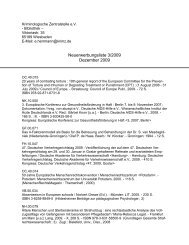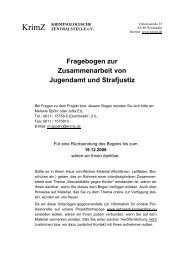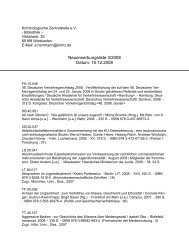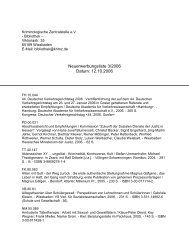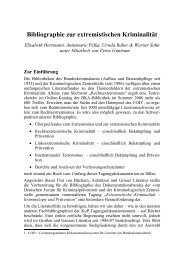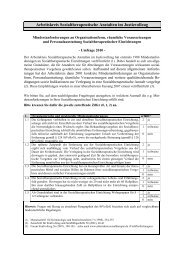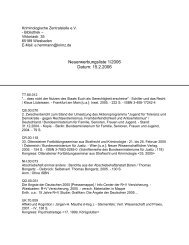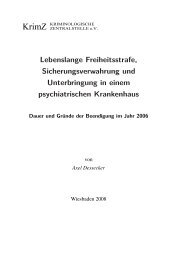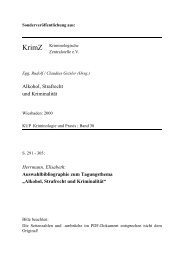Tätigkeitsbericht 2010 - Kriminologische Zentralstelle eV
Tätigkeitsbericht 2010 - Kriminologische Zentralstelle eV
Tätigkeitsbericht 2010 - Kriminologische Zentralstelle eV
Sie wollen auch ein ePaper? Erhöhen Sie die Reichweite Ihrer Titel.
YUMPU macht aus Druck-PDFs automatisch weboptimierte ePaper, die Google liebt.
Summary<br />
Moreover, the KrimZ also works on criminological findings, focusing on the<br />
analysis of statistical data relevant to criminology and on secondary analysis<br />
of research results. Last but not least, the Centre also conducts its own empirical<br />
research projects, which are mostly financed from its own budget, but also<br />
through third-party funding. These projects are mainly nationwide studies in<br />
the area of criminal justice. It is taken for granted that rigorous principles of<br />
science and documentation are valid for the KrimZ too. Nevertheless, the<br />
KrimZ sees it as its special duty to bring own working results in public policy<br />
considerations.<br />
In 2009 the Federal Agency for the Prevention of Torture was established as a<br />
national independent mechanism for the prevention of torture and other cruel,<br />
inhuman or degrading treatment or punishment in Germany (see section 8). The<br />
Agency will undertake regular visits to places where people are deprived of<br />
their liberty, identify problems and make recommendations to the relevant authorities.<br />
Furthermore, it will report annually to the German parliament and<br />
government. In <strong>2010</strong> it was extended by a commission responsible for the<br />
monitoring of prisons, police cells, psychiatric hospitals as well as a range of<br />
similar institutions under the jurisdiction of the federal states. The Agency’s<br />
administration is an annex to the KrimZ, and it has its own website featuring<br />
some information in English (http://www.antifolterstelle.de/).<br />
4. Activities in <strong>2010</strong> and beyond<br />
Empirical research of the institute focused on several issues, one of them being<br />
sexual offences, which have been the focus of discourses both in the political<br />
sphere and in the media in Germany for several years. In the project on<br />
„Dangerous Sex Offenders: Careers and Penal Reactions“ (see section 5.2.1)<br />
an extensive survey of case records was made, and the final report will be<br />
published early in 2011. Another project evaluating social therapy treatment<br />
in correctional institutions (section 5.3.3), which is a version of the therapeutic<br />
community approach originating in Denmark, is also concerned with the<br />
group of sex offenders. Recent judgments of the European Court of Human<br />
Rights and their consequences for the traditional system of preventive detention<br />
(Sicherungsverwahrung) in Germany triggered new empirical research on<br />
the right not to have a heavier penalty imposed than the one applicable at the<br />
time of an offence and the practise of preventive detention for an indefinite<br />
period of time (section 5.2.2).<br />
The scope of the KrimZ‘s research was extended by research on „Cooperation<br />
between Child Care and Criminal Justice Agencies in Cases of Sex Offences<br />
against Children“, a project co-funded by the European Commission. The<br />
49


